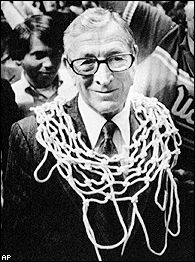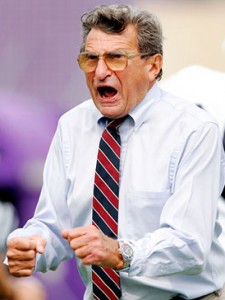John Wooden Walked Away On Top

Happy 99th Birthday to John Wooden, the greatest coach of all-time.
Today marks the 99th birthday of coaching legend John Wooden. Unlike some current coaching greats, Wooden knew when it was time to walk away. It is a legacy that others may want to consider emulating.
When Wooden announced following an emotional 75-74 victory over former assistant Denny Crum and the Louisville Cardinals in the semifinals of the 1975 NCAA Tournament that the upcoming championship game would be his last on the bench, it caught most people by surprise.
But, sure enough, after the Bruins defeated Kentucky for their 10th title in 12 years, Wooden walked away with his legacy secure.
In the ensuing 34 years, the legend of the “Wizard of Westwood” has grown in stature as no coach has come close to matching Wooden’s amazing resume of success.
At the time of his retirement, most Americans retired at age 65, so even though Wooden was obviously still at the top of his game, his departure mirrored the culture of his time. Plus, considering that he reportedly never earned more than $35,000 while coaching at UCLA, Wooden likely made significantly more money following his retirement than he ever did on the court.
That is in stark contrast to the coaches of today, who are inundated with such luxurious contracts and other perks that walking away at any age is increasingly difficult.
Not to say that I think either Joe Paterno or Bobby Bowden, two coaching legends currently confronting the issue of mortality, are coaching for the money. Instead, I truly believe that they are hanging on because of their love for the game and desire to keep doing what they have done their entire adult lives for as long as possible.

Joe Paterno is still going strong at 82 years old.
In some respects, the situation of Bowden and Paterno is no different than that of players like Brett Favre and Junior Seau, who struggle to walk away from their playing careers despite having reached an age when most players retire.
Of course, in all cases, it ultimately is about performance. In Favre’s case, he is illustrating that he still has what it takes to compete. Seau has demonstrated in recent years that he still has some of the ability that made him a superstar.
Many supporters of Bowden and Paterno argue that they have done so much for their respective universities that they deserve to coach as long as they desire, regardless what happens to the team they assembled.
In Paterno’s case, the cries for his retirement, which raged earlier this decade when the Nittany Lions went 26-33 over a five year stretch, have quieted significantly as the Nittany Lions have gone 45-12 over the last five years.
At Florida State, the situation is growing uglier by the day as Bowden continues to dig in his heels while calls for his head from some former loyalists grows louder.
Bowden has not had a losing season at FSU since his first year at the helm in 1976, but the Seminoles may be headed to that result in 2009 with a 2-4 record. Despite defeating BYU when they were in the top 10, the Seminoles have suffered embarrassing losses to South Florida and Boston College and had to score twice in the final minute to defeat Jacksonville State.
Knowing when to walk away has long been a challenge for coaches. Both Bill Walsh and Dick Vermeil retired following emotionally draining Super Bowl runs only to soon regret their decision.
Following his third Super Bowl title with the San Francisco 49ers, Walsh left a 49ers team that would repeat as champion the following season. After a short-lived career as a broadcaster, Walsh returned to the sidelines as the head coach at Stanford only to again retire after just three seasons.
Having finally reached the top with the St. Louis Rams, Vermeil felt the pressure to retire and left a team that would make another Super Bowl appearance two years later. He returned to coach five years with the Kansas City Chiefs, but made only one playoff appearance during his tenure.

Losses and a campus academic scandal threaten to stain the legacy of Bobby Bowden
In college football where Bowden and Paterno both have become iconic campus figures, the balance between loyalty to the coach and loyalty to the school and football program is a fine line. Certainly no fan of the Nittany Lions or Seminoles wants to see their team fall short on the field, but the question that really has no easy answer is whether coaches have “earned” the right to decide when they will walk away, rather than having performance on the field dictate the decision.
In today’s multi-million dollar world of college athletics there isn’t as much room for sentimentality as there may have once been.
I’m not advocating that Paterno and Bowden should have followed the path of Wooden and retired at the age of 65. However, here’s hoping that they both have retired by the time they turn 99.
Coming from a USC fam and going there myself, I have to admit that nobody comes close to touching Wooden as the greatest of all-time.
It's hard to imagine that any coach in any major sport could have the run(s) these days that Wooden had at UCLA.
Bill Walton said it best when he called Wooden the perfect example of a man making the world a better place.
You said it all! At the time (1966-75), I didn't like UCLA nor John Wooden since they were dominating college basketball and I always cheered for the other team. But, had to admit then and now that Wooden was a great coach and had great teams during that era. But, more importantly he was also a 'super' person and set a great example on and off the court. Hope he makes it past his 100th birthday in 2010.
Dean, Saw the mention of this piece in the WSJ. Awesome! Very nice article!
great job Dean!
ypkvkgw